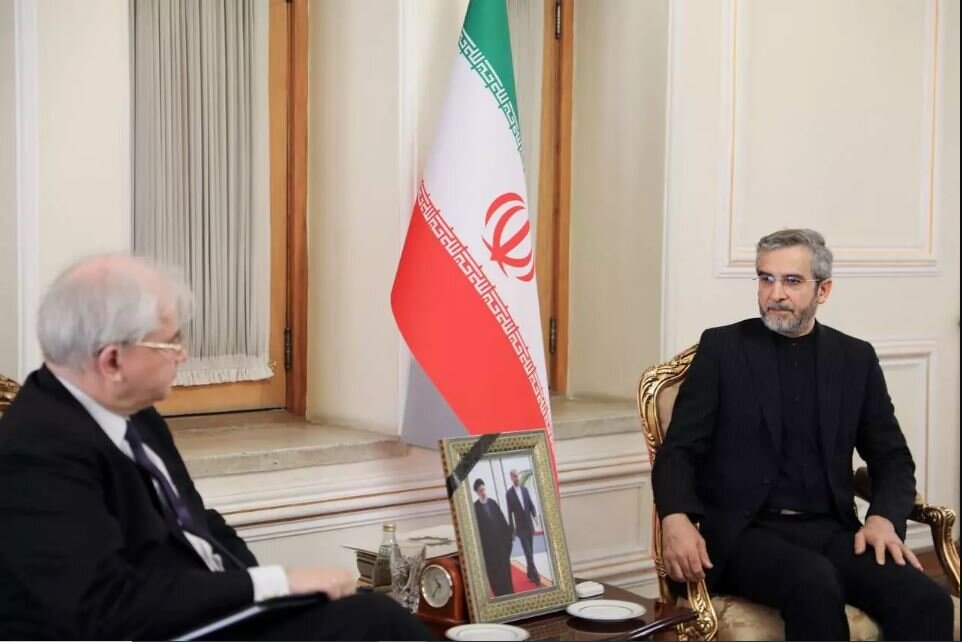Iranian, Russian officials discuss Caucasus developments in Tehran meeting

TEHRAN – Igor Khovayev, the Special Representative of the Russian Foreign Minister for the Settlement of Issues between Azerbaijan and Armenia, visited Tehran on Sunday to discuss the latest developments in the Caucasus region.
During his visit, he met with Ali Baqeri Kani, Iran's acting Foreign Minister.
Baqeri Kani highlighted the alignment of Iran and Russia's positions on key regional and international issues. He underscored that the Caucasus region is of significant national interest and security concern for both nations, stressing the necessity of bilateral cooperation in this area.
The Iranian acting Foreign Minister reiterated Iran's commitment to the peaceful resolution of regional conflicts. He pointed out that the current sensitive developments in the Caucasus, particularly the growing foreign interventions, require strategic coordination and ongoing consultations between Iranian and Russian officials.
Baqeri emphasized the importance of utilizing regional mechanisms, such as the 3+3 format, to address regional issues, enhance cooperation and convergence, and ensure the security, stability, and collective interests of the countries in the Caucasus.
Igor Khovayev conveyed greetings from Russian Foreign Minister Sergey Lavrov and provided an update on Russia's diplomatic efforts to establish peace in the Caucasus.
He stressed the need for a joint strategic assessment of the region's developments by both countries and the importance of close, continuous interaction and coordination between Iranian and Russian officials to counter external interference in the region.
Iran ready to assist Afghanistan in overcoming challenges: acting FM
On Sunday evening, Baqeri Kani engaged in a telephone conversation with the Taliban’s caretaker foreign minister, Amir Khan Muttaqi.
The discussion focused on enhancing bilateral cooperation, the current situation in Gaza, and the crimes of the Zionist regime in that region.
During the call, Baqeri Kani reaffirmed Iran's readiness to collaborate with Afghanistan across various sectors and emphasized the continuation of support for the Afghan people.
In addition to bilateral relations, Baqeri Kani addressed the ongoing violence in Gaza. He highlighted South Africa's legal initiative to lodge a complaint against this regime at the International Court of Justice (ICJ) and noted the diplomatic actions taken by several countries, including those in Latin America, to sever ties with the Zionist regime.
Baqeri Kani stressed the importance of collective action by Islamic nations to exert pressure on the regime to cease its actions against Palestinians. He particularly emphasized the role of the Organization of Islamic Cooperation in coordinating these efforts.
In a case brought by South Africa against Israel, the ICJ, the UN’s top court, issued three provisional measures on January 26, March 28, and May 24.
They respectively ordered Israel to take all measures within its power to prevent genocide in Gaza, allow unimpeded access to food aid into the besieged Palestinian territory, and immediately halt its military invasion of the southern city of Rafah.
Muttaqi, on his part, lauded the positive relations between Iran and Afghanistan. He expressed optimism that the bilateral cooperation between Tehran and Kabul would continue to grow and expand across various domains, further strengthening the ties between the two neighboring countries.
Iranian, UAE discuss ways to end Gaza crisis
Baqeri Kani also had a phone conversation with Sheikh Abdullah bin Zayed Al Nahyan, the Foreign Minister of the United Arab Emirates (UAE), to discuss mutual interests and the latest developments in Gaza.
During the call, which happended on Sunday, Baqeri Kani extended congratulations to the UAE government and people over the Muslim festivity of Eid al-Adha (Feast of Sacrifice).
He also condemned the brutal actions of the occupying Israeli regime in Gaza and other parts of Palestine, urging Muslim countries to employ all possible measures to end the Zionist regime’s genocide in Gaza and support the oppressed people in the region.
Sheikh Abdullah reciprocated by congratulating the Iranian government and people on Eid al-Adha and expressed his condolences over the martyrdom of the late Iranian President Ebrahim Raisi and Foreign Minister Hossein Amir Abdollahian.
He highlighted a recent meeting in Jordan focused on Palestine, stressing the importance of delivering humanitarian aid to the people of Gaza and taking effective measures to halt the Zionist regime’s attacks.
“The UAE is doing its utmost to stop the war and send humanitarian aid to the people in Gaza,” Al Nahyan stated, calling it “our humanitarian duty.”
Israel launched the current offensive against Gaza, targeting hospitals, homes, and places of worship, following a surprise attack by Palestinian resistance movements, named Operation Al-Aqsa Storm, on October 7.
Simultaneously, the regime has imposed a nearly complete blockade on the coastal enclave, severely limiting the supply of essential goods such as food, medicine, electricity, and water to Palestinians.
The conflict has resulted in at least 37,337 Palestinian deaths, most of them women and children, with another 85,299 injured. Over 1.7 million people have been internally displaced during the war.
